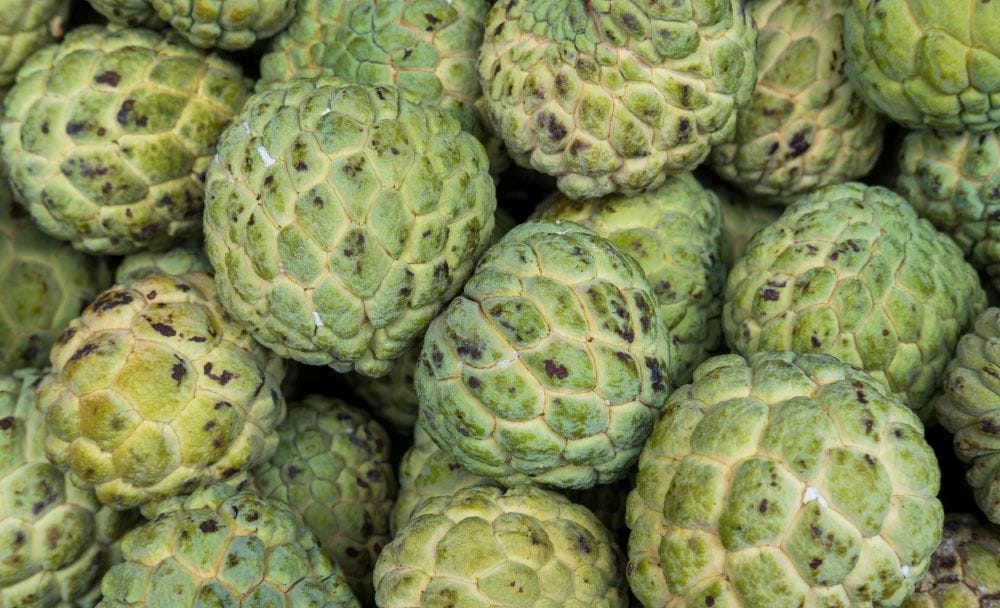Reviewed by Experts
The custard apple is a unique fruit that may not be as widely recognized as its popular counterparts, like apples or oranges. However, it certainly holds a lot of surprises when it comes to health and well-being. Beyond its delectable flavor and creamy texture, custard apple harbors various nutritional benefits that make it a remarkable addition to any diet.
This article examines custard apple fruit and explores its 15 benefits that go beyond satisfying your taste buds. So, join us as we uncover the custard apple benefits that make this fruit truly extraordinary.
What is a custard apple?
The custard apple, also called the sugar apple or sweetsop, is a unique tropical fruit that captures the imagination with its distinct appearance and heavenly taste. It belongs to the Annona family of fruits and has an oblong or heart-shaped exterior. The exterior hides a creamy, custard-like flesh that is a delight to the senses.
Enclosed within its greenish-brown knobby skin are luscious segments often enjoyed fresh or used in various culinary creations. With a subtly sweet flavor reminiscent of a blend of tropical fruits, the custard apple is a true gem of nature with numerous surprises regarding its nutritional composition and health benefits.
Nutritional value of custard apple
100 grams of custard apple contains the following nutrition: [1]
| Name | Amount |
|---|---|
| Water | 79.4 g |
| Energy | 75 kcal |
| Protein | 1.57 g |
| Fiber, total dietary | 3 g |
| Glucose | 5.93 g |
| Calcium, Ca | 10 mg |
15 benefits of eating custard apple
Here are 15 custard apple benefits that you must know for your health.
-
Boosts immune system
Custard apple is packed with immune-boosting nutrients like vitamin C, which helps strengthen the body’s defense against infections and diseases. [2]
2. Prevents aging
The fruit contains a good amount of antioxidants that allow your body to fight the signs of aging. [2]
3. Enhances digestion
With its high fiber content, custard apple aids digestion and prevents indigestion. It promotes smooth bowel movements, ensuring a healthy digestive system. [2]
4. Helps control stress and depression
When it comes to custard apple benefits, the vitamin B content of custard apples helps relax the mind and overcome the symptoms of stress and depression. [2]
5. Improves vision
Custard apple contains vitamin A and antioxidants, which promote healthy vision and protect against age-related degeneration. [2]
6. Fetus development
Custard apples can help with the development of the fetus’s brain, immune system, and nervous system. [2]
7. Enhances skin health
Custard apple’s vitamin C content aids collagen production, promoting healthy skin. It also possesses antioxidant properties that help combat skin aging and damage caused by free radicals. [2]
8. Regulates blood pressure
The essential mineral found in custard apples helps regulate blood pressure levels. [3]
9. Supports pregnancy
Regular consumption of custard apples during pregnancy helps reduce miscarriage chances and labor pain. [2]
10. Provides energy
Loaded with natural sugars and carbohydrates, custard apple provides a quick and sustainable energy boost, making it an ideal snack for active individuals. [2]
11. Boosts bone health
Custard apple contains calcium, magnesium, and phosphorus, which are essential minerals for maintaining strong bones. [1]
12. Anti-inflammatory properties
The fruit possesses anti-inflammatory compounds that help reduce inflammation in the body. [2]
13. Supports liver health
Custard apple has hepatoprotective properties, which aid in maintaining a healthy liver. [2]
14. Anti-diabetic
Custard apple is anti-diabetic and helps control blood sugar levels. [2]
15. Calms nervous system
The vitamin B complex in custard apples helps control GABA neuron chemicals to relax the mind. [2]
How to Eat custard apple
When it comes to enjoying custard apple, here are some delightful ways to savor its unique flavor and creamy texture:
-
Fresh and simple
The simplest way to enjoy custard apple is by eating it fresh, straight from the fruit. Scoop the creamy flesh with a spoon or use your fingers to relish the smooth texture and subtly sweet taste.
2. Custard apple smoothie
Blend custard apple flesh with your favorite fruits like banana, mango, or pineapple to create a refreshing and nutritious smoothie. Add a splash of milk or yogurt, a drizzle of honey, and some ice cubes for a creamy and satisfying beverage.
3. Custard apple salad
Combine it with other tropical fruits like papaya, kiwi, and dragon fruit for a vibrant and refreshing salad. Toss in some mint leaves and a squeeze of lime juice for a burst of freshness.
4. Custard apple ice cream or sorbet
Freeze custard apple pulp and blend it with a frozen banana or coconut milk to create a delicious, creamy ice cream or sorbet.
5. Custard apple chutney
Combine mashed custard apple with spices like ginger, garlic, and chili to create a flavorful chutney. This condiment can be enjoyed as a spread on sandwiches.
FAQs on Custard Apple
1. Is custard apple safe to consume during pregnancy?
Yes, custard apple is generally considered safe to consume during pregnancy. It is a good source of nutrients for fetal development. However, consult your healthcare provider before making significant changes to your diet during pregnancy.
2. Is custard apple suitable for individuals with diabetes?
Custard apples should be consumed moderately by individuals with diabetes due to their natural sugar content. However, its low glycemic index slowly impacts blood sugar levels. Monitoring blood glucose levels and consulting with a healthcare professional for personalized dietary guidance is essential.
3. What are the uses of custard apples?
Custard apple has various uses beyond consumption. The custard apple tree’s leaves, bark, and roots have been used for their potential medicinal properties. Additionally, custard apple seeds have been used to produce oil, which is used in cosmetic formulations.
4. Are there any disadvantages to consuming custard apples?
While custard apple offers numerous health benefits, there are a few probable disadvantages to be aware of. The fruit contains natural sugars and carbohydrates, so excessive consumption may lead to weight gain or blood sugar fluctuations.
Conclusion
Custard apple proves to be more than just a delightful tropical fruit. With its creamy texture, subtly sweet flavor, and impressive health benefits, custard apple has rightfully earned its place as a nutritional powerhouse. From aiding the immune system to improving skin health, this fruit offers a wide range of surprising advantages beyond its delectable taste.
Whether you’re looking to support your overall well-being, maintain a healthy heart, nourish your skin, or enjoy a tasty and nutritious treat, custard apple is a remarkable addition to your diet. Its abundant vitamins, minerals, fiber, and antioxidants make it a valuable asset in promoting a healthy lifestyle.
Disclaimer:
The information provided here is not intended to replace professional advice or treatment.
References:
Cherimoya, raw
A review on insight of immense nutraceutical and medicinal potential of custard apple (Annona squamosa Linn.) April 2019
Nutritional, phytochemical, and in vitro anticancer potential of sugar apple (Annona squamosa) fruits.





















